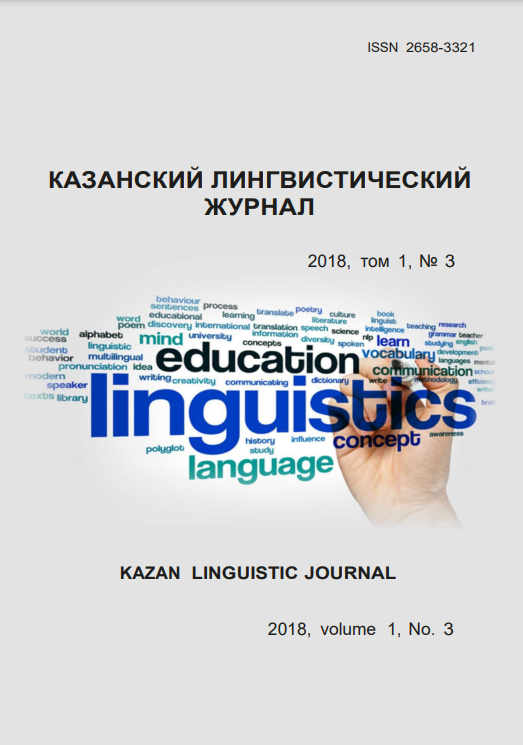Cross-cultural specifics of training translation / intepreting
Keywords:
education, the French language, Linguistics, translation, regional culture, education technologiesAbstract
This study proves the feasibility of analyzing the means of transmitting a regional cultural specific character in the framework of foreign language teaching at a linguistic university as one of the key elements of training for translators and interpreters.
The principle of regionalization is one of the main strategies of education development, the implementation of which signifies a new stage in the formation of the elective component in modern Russian education. Wide development of tourism and sports infrastructure in the Republic of Tatarstan, being one of the most popular constituent entities of the Russian Federation from this perspective, dictates certain requirements to modify the content of language education through the study of cultural and linguistic specificity of the region. At the same time the main purpose of realization of the regional component in a language university educational practice is the training of Linguistics Degree students the basis of the ethnic culture through the prism of a foreign language with its simultaneous inclusion into the set of world common cultural and moral values: understanding and respect of foreign culture, leniency and religious tolerance. Owing to the introduction of the regional component in the practice of language
training for students-translators, there can be observed several advantages: wider common cultural and linguistic world view of students, development of skills for the self-guided work, perfecting of abilities for contrastive analysis and synthesis of the material.
The system characteristic of implementation methods of regional elements of cultural and humane terms for the training of students-translators/interpreters has been worked out on the basis of French language teaching. This paper also presents a comparative analysis of different types of in-class and extra-curricular activities with Linguistics Degree students and the corresponding results.
The findings may be used by foreign language teachers at secondary school and higher educational institutions, as well as by students, graduates and post-graduates researching foreign language teaching methodology.
References
Литература
Асланова М.А., Кудаев М.Р. Развитие региональной системы образования Республики. Адыгея с учетом современных тенденций. Майкоп: Изд-во АГУ, 2008. 177 с.
Белогуров А.Ю. Фактор поликультурности в контексте этнонациональной стратегии развития российского образования // Проблемы поликультурного образования: Междунарю сб. науч. ст. Махачкала: ИПЦ ДГУ, 2001. С. 27–31.
Денисова Е.В. Развитие мотивации к изучению иностранного языка с опорой на национально-региональный материал в старших классах общеобразовательной школы: дис канд. пед. наук. Екатеринбург, 2002. 163 c
Корниенко П.А Использование краеведческих материалов в обучении иностранным языкам (На примере Карачаево-Черкесской Республики, английский язык): дис канд. пед. наук. Пятигорск, 2005. 185 с.
Кузнецова А.П. Реализация национально-регионального компонента содержания обучения иностранным языкам в интегрированном курсе на проектной основе: дис канд. пед. наук. Москва, 2002. 285 с.
Общеевропейские компетенции владения иностранным языком: Изучение, обучение, оценка / пер. с англ. под ред. проф. К.М. Ирисхановой. М.: МГЛУ, 2003. 261 с.
Ратнер Ф.Л. Национально-региональный компонент в учебных дисциплинах высшей школы РТ как фактор национальной самобытности // Глобализация и национальная самобытность. Форум языков. Казань: Экоцентр, 2007. С. 135–138.
Шаповалов В.К. Этнокультурная направленность российского образования: автореф. дис д-ра пед. наук.
М., 1997. 36 с.
Ageeva A.V., Abdullina L.R., Lukina M.S. Internet comments as means of developing social and cultural competence of students in linguistics major / INTED2017 Proceedings. Valencia: IATED, 2017. Р. 4462–4469.
Fèvre, J.-M. Manuel de gestion interculturelle. Sarreguemines: Colprint, 2013.
Escudé P., Janin P. Intercompréhension, clé du pluralisme. Paris, CLE International, 2015.
Mukhametshina E.E., Solovyova E.G., Pomortseva N.P. Integrative approach to enhancing linguists' background knowledge in culture / Journal of History Culture and Art Research. Vol.6, No. 4, 2017. P. 538–545.
Nieto C., Booth M.Z. Cultural competence: Its influence on the teaching and learning of international students / Journal of Studies in International Education. V.14, No.4, 2010. P. 406–425.
Волонтеры на универсиаде. Казань 2013 / Спорт в Казани. URL: htpp://sport-in-kazan.ru/volontery-na- universiade-kazan-2013 (дата обращения: 01.05.2018).
Волонтерская программа ЧМ–2015: цифры и факты / Официальный сайт 16-го Чемпионата мира ФИНА по водным видам спорта 2015 в Казани. URL: htpp://kazan2015.com/ ru/news_items/3567 (дата обращения 02.02. 2018).
References
Aslanova, M.A., Kudaev, M.R. Razvitie regional'noj sistemy obrazovaniya Respubliki Adygeya s uchetom sovremennyh tendencij. Majkop: Izd-vo AGU, 2008. 177 р.
Belogurov, A.YU. Faktor polikul'turnosti v kontekste ehtnonacional'noj strategii razvitiya rossijskogo obrazovaniya // Problemy polikul'turnogo obrazovaniya: Mezhdunaryu sb. nauch. st. Mahachkala: IPC DGU, 2001. Р. 27–31.
Denisova, E.V. Razvitie motivacii k izucheniyu inostrannogo yazyka s oporoj na nacional'no-regional'nyj material v starshih klassah obshcheobrazovatel'noj shkoly: dis. kand. ped. nauk. Ekaterinburg, 2002. 163 р.
Kornienko, P.A Ispol'zovanie kraevedcheskih materialov v obuchenii inostrannym yazykam (Na primere Karachaevo- CHerkesskoj Respubliki, anglijskij yazyk): dis. kand. ped. nauk. Pyatigorsk, 2005. 185 р.
Kuznecova, A.P. Realizaciya nacional'no-regional'nogo komponenta soderzhaniya obucheniya inostrannym yazykam v integrirovannom kurse na proektnoj osnove: dis. kand. ped. nauk. Moskva, 2002. 285 р.
Obshcheevropejskie kompetencii vladeniya inostrannym yazykom: Izuchenie, obuchenie, ocenka / per. s angl. pod red. prof. K.M. Iriskhanovoj . M: MGLU, 2003. 261 р.
Ratner F.L. Nacional'no-regional'nyj komponent v uchebnyh disciplinah vysshej shkoly RT kak faktor nacional'noj samobytnosti // Globalizaciya i nacional'naya samobytnost'. Forum yazykov. Kazan': Ekocentr, 2007. Р. 135–138.
Shapovalov V.K. Etnokul'turnaya napravlennost' rossijskogo obrazovaniya: avtoref. dis. d-ra ped. nauk. Moskva,
36 р.
Ageeva A.V., Abdullina L.R., Lukina M.S. Internet comments as means of developing social and cultural competence of students in linguistics major / INTED2017 Proceedings. Valencia: IATED, 2017. Р. 4462–4469.
Fèvre, J.-M. Manuel de gestion interculturelle. Sarreguemines. Colprint, 2013.
Escudé, P., Jani,n P. Intercompréhension, clé du pluralisme. Paris, CLE International, 2015.
Mukhametshina, E.E., Solovyova, E.G., Pomortseva, N.P. Integrative approach to enhancing linguists' background knowledge in culture // Journal of History Culture and Art Research. Vol. 6, No. 4, 2017. P.538–545.
Nieto, C., Booth, M.Z. Cultural competence: Its influence on the teaching and learning of international students // Journal of Studies in International Education. V. 14, No. 4, 2010. P. 406–425.
Volontery na universiade. Kazan' 2013 // Sport v Kazani. URL: htpp://sport-in-kazan.ru/volontery-na-universiade- kazan-2013 (data obrashcheniya: 01.05.2018).
Volonterskaya programma CHM–2015: cifry i fakty / Oficial'nyj sajt 16-go CHempionata mira FINA po vodnym vidam sporta 2015 v Kazani. URL: htpp://kazan2015.com/ ru/news_items/3567 (data obrashcheniya 02.02. 2018).






